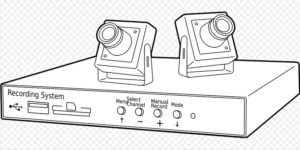Security cameras are one of the most reliable countermeasures for both private and commercial properties. And you don’t have to spend thousands of dollars to get it.
In this article, you’ll learn the pros and cons of the wireless security camera system so that you won’t regret your purchase.
The Pros
 The greatest thing about wireless cameras is their flexibility and adjustability. Since there won’t be any cables connecting the cameras to the receiver and even power sources, you can place them practically anywhere you want. It makes hiding the cameras way easier and more effortless than the wired counterpart. But for the cordless cameras, you need to know that they are powered with batteries, which require routine checking to know if they need to be recharged or replaced.
The greatest thing about wireless cameras is their flexibility and adjustability. Since there won’t be any cables connecting the cameras to the receiver and even power sources, you can place them practically anywhere you want. It makes hiding the cameras way easier and more effortless than the wired counterpart. But for the cordless cameras, you need to know that they are powered with batteries, which require routine checking to know if they need to be recharged or replaced.
Second, a wireless surveillance system uses a WiFi connection to operate. If you can integrate it with a cloud service, you can have real-time access from your gadgets to the visual data transmitted by the cameras. Moreover, if you use 1TB or 2TB cloud storage service, as long as there is no network interruption, your cameras can run 24/7! You’ll get access to the video records of all things happening around your house.
Third, cordless cameras that use batteries don’t rely on your house’s electricity to function. Therefore, intruders won’t compromise your surveillance system even if they manage to put the power off.
The Cons
Since wireless devices of any kind rely on the WiFi network, if the signal gets disrupted, your cameras won’t function properly. And signal jammers are everywhere on the Internet these days. However, to take the whole system down completely is almost impossible.
Another downside of a wireless security camera is you’ll need to place all the cameras close to the main hub. The longer the distance between them can result in malfunction. Consequently, it will also be difficult to upscale this system. If you want to add more cameras, they can’t still be too far away from each other because of that signal limitation.
Lastly, battery-powered cameras require maintenance more than you think. In fact, it can be cumbersome. You will have to check the batteries at least once every 4 or 6 months. If you use rechargeable batteries, you need to know that those batteries have a life expectancy, mostly around 1 or 2 years. After that, the charge capacity won’t reach 100%. In other words, even though the indicator says that the batteries are fully charged, the power stored there is less than displayed.
Conclusion
From the discussion above, we can conclude that a private property with standard area coverage is best suited to the wireless security camera system. Whereas, a big estate or commercial building that someday will require a surveillance system scale-up fits best with a wired system. …


